Detailed Introduction
DETAILED INTRODUCTION
About the ggplot2 Package
Introduction "ggplot2 is an R package for producing statistical, or data, graphics, but it is unlike most other graphics packages because it has a deep underlying grammar. This grammar, based on the Grammar of Graphics (Wilkinson, 2005), is composed of a set of independent components that can be composed in many different ways. [..] Plots can be built up iteratively and edited later. A carefuly chosen set of defaults means that most of the time you can produce a publication-quality graphic in seconds, but if you do have speical formatting requirements, a comprehensive theming system makes it easy to do what you want. [..] ggplot2 is designed to work in a layered fashion, starting with a layer showing the raw data then adding layers of annotation and statistical summaries.
ggplot2,
First We look into the header of Diamonds and Mtcars data
head(diamonds)
head(mtcars)
Comparison qplot vs ggplot
qplot histogram
qplot(clarity, data=diamonds, fill=cut, geom="bar")
ggplot histogram -> same output
ggplot(diamonds, aes(clarity, fill=cut)) + geom_bar()
Scatterplot
qplot(wt, mpg, data=mtcars)
qplot(log(wt), mpg - 10, data=mtcars)
Add aesthetic mapping (hint: how does mapping work)
qplot(wt, mpg, data=mtcars, color=qsec)
Change size of points (hint: color/colour, hint: set aesthetic/mapping)
qplot(wt, mpg, data=mtcars, color=qsec, size=3)
qplot(wt, mpg, data=mtcars, colour=qsec, size=I(3))
Use alpha blending
qplot(wt, mpg, data=mtcars, alpha=qsec)
Continuous scale vs. discrete scale
head(mtcars)
qplot(wt, mpg, data=mtcars, colour=cyl)
levels(mtcars$cyl)
qplot(wt, mpg, data=mtcars, colour=factor(cyl))
Continuous scale vs. Discrete scale
head(mtcars)
qplot(wt, mpg, data=mtcars, colour=cyl)
levels(mtcars$cyl)
qplot(wt, mpg, data=mtcars, colour=factor(cyl))
Use different aesthetic mappings
qplot(wt, mpg, data=mtcars, shape=factor(cyl))
qplot(wt, mpg, data=mtcars, size=qsec)
Combine mappings (hint: hollow points, geom-concept, legend combination)
qplot(wt, mpg, data=mtcars, size=qsec, color=factor(carb))
qplot(wt, mpg, data=mtcars, size=qsec, color=factor(carb), shape=I(1))
qplot(wt, mpg, data=mtcars, size=qsec, shape=factor(cyl), geom="point")
qplot(wt, mpg, data=mtcars, size=factor(cyl), geom="point")
Bar-plot
qplot(factor(cyl), data=mtcars, geom="bar")
Flip plot by 90°
qplot(factor(cyl), data=mtcars, geom="bar") + coord_flip()
Difference between fill/color bars
qplot(factor(cyl), data=mtcars, geom="bar", fill=factor(cyl))
qplot(factor(cyl), data=mtcars, geom="bar", colour=factor(cyl))
Fill by variable
qplot(factor(cyl), data=mtcars, geom="bar", fill=factor(gear))
Use different display of bars (stacked, dodged, identity)
head(diamonds)
qplot(clarity, data=diamonds, geom="bar", fill=cut, position="stack")
qplot(clarity, data=diamonds, geom="bar", fill=cut, position="dodge")
qplot(clarity, data=diamonds, geom="bar", fill=cut, position="fill")
qplot(clarity, data=diamonds, geom="bar", fill=cut, position="identity")
qplot(clarity, data=diamonds, geom="freqpoly", group=cut, colour=cut, position="identity")
qplot(clarity, data=diamonds, geom="freqpoly", group=cut, colour=cut, position="stack")




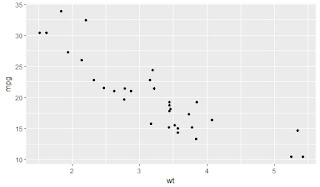




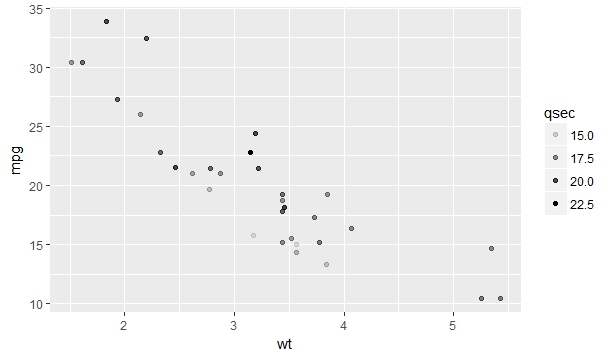




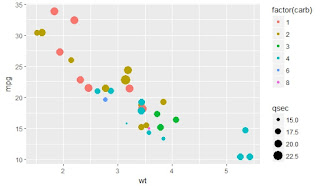
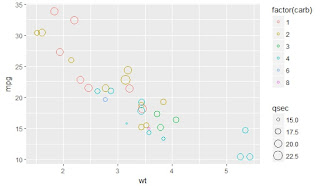









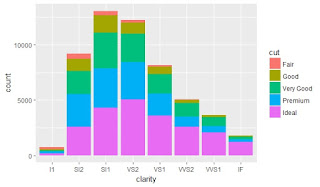

No comments:
Post a Comment